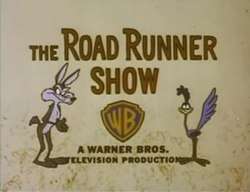The Road Runner Show
The Road Runner Show is a 1966-1972 animated anthology series which compiled theatrical Wile E. Coyote and the Road Runner cartoons from the Looney Tunes and Merrie Melodies, which were produced by Warner Bros. Cartoons between 1949 and 1964. Several of the shorts, especially the ones produced from 1965 onward, were produced by DePatie–Freleng Enterprises after Warner Bros. closed their animation studio. DePatie–Freleng Enterprises provided the animation for the show's intro and closing credits.[1][2]
| The Road Runner Show | |
|---|---|
 | |
| Genre | Comedy |
| Country of origin | United States |
| Original language(s) | English |
| Production | |
| Running time | 30 minutes |
| Production company(s) | Warner Bros. Television |
| Distributor | Warner Bros. Television Distribution |
| Release | |
| Original network | CBS (1966-1968) ABC (1971-1973) |
| Original release | September 10, 1966 – September 2, 1972 |
Background
From 1966 to 1968, The Road Runner Show initially ran for two seasons on CBS.[3][4] From 1968 to 1969, CBS combined The Road Runner Show with The Bugs Bunny Show to produce The Bugs Bunny/Road Runner Hour. The Road Runner and the Coyote more often shared at least an hour with Bugs Bunny on CBS.[5] In 1971, ABC picked up The Road Runner Show and ran for two seasons until 1973, when the network dropped the show due to its excessively aggressive scenes. Later on, CBS re-acquired the show and aired them as reruns under The Bugs Bunny/Road Runner Hour until the mid-80s.[6]
Each show would feature one Road Runner/Coyote cartoon, with a Tweety and Sylvester cartoon in the middle segment, and other WB animated character(s) in the third segment (usually Elmer Fudd, Foghorn Leghorn, Speedy Gonzales, Pepe Le Pew and Hippety Hopper). The intro of every cartoon was replaced with a simple titlecard along with the shortened version of William Lava's arrangement of The Merry-Go-Round Broke Down.
Theme song
The theme song was written and performed by Barbara Cameron. In 1999, it was covered by the Mexican band Chicos de Barrio and was later parodied in Histeria! featuring Father Time and Big Fat Baby. It has also been covered by Barenaked Ladies, and Barbara Cameron re-recorded the theme with her son, Jazz violinist Doug Cameron (with Paul Julian's iconic Beep-Beep and other sound effects from the shorts used on the recording) for his Different Hats album in 2008. An instrumental version was used as the theme song for the Road Runner and Wile E. Coyote segments of The Looney Tunes Show.
See also
- The Bugs Bunny Show
- Adventures of the Road Runner
References
- Cawley, John; Korkis, Jim (1990). "Cartoon Superstars". Pioneer Books. p. 52. Retrieved July 3, 2020 – via Google Books.
- "Chase's 1997 Calendar of Events". Contemporary Books. October 1, 1996. p. 470. Retrieved July 3, 2020 – via Google Books.
- Shapiro, Mitchell E. (1992). Television Network Weekend Programming, 1959-1990. McFarland. ISBN 978-0-89950-682-1. Retrieved January 15, 2020.
- McNeil, Alex (1991). Total Television: A Comprehensive Guide to Programming from 1948 to the Present. Penguin Books. p. 639. ISBN 978-0-14-015736-9. Retrieved January 15, 2020.
- Woolery, George (1983). "Children's Television: The First Thirty-five Years (1946-1981) - Part 1: Animated Cartoon Series". Scarecrow Press. pp. 237–238. Retrieved July 3, 2020 – via Google Books.
- Fischer, Stuart (June 10, 2014). "Kids' TV: The First Twenty-Five Years". Open Road Media. Retrieved July 3, 2020 – via Google Books.
External links
- The Road Runner Show Page, by Kevin McCorry; retrieved 25 November 2018